|
After our 9-day trip through the south of Sana'a we experienced Sana'a after Ramadan. Quite a big difference though, the city is much more alive and most
shops are actually open during daytime. Again we explored the Old City and parts of its outskirts taking several rides with these small Suzuki mini-vans. Our previous explorations of Sana'a helped us quite a bit,
the maps we had of Sana'a were of no particular use. The fine mazed streets just demand a good memory and some navigational skills to get around.
The 2nd day after our return to the Sultan Palace
Hotel, Anwar the reception manager invited us to a Yemeni wedding later that week. The wedding was going to take place just next to our Hotel. Without hesitation we accepted his offer, already curious to what we
were going to experience. After having spend more than 2 weeks in Yemen we suspected an Yemeni marriage would be something really special, a cultural event not to miss out on.
The atmosphere in the Sultan
Palace Hotel was again friendly but also quite amazing. We spend many evenings in the sitting area at the ground floor talking about all sorts of things. Actually we've found the freedom that Yemeni people breath
quite refreshing, they don't shy away from discussion and they are eager to learn about how things are in the western world we live in. And not only to know about the western world but also to give their opinion
about things as they see it.
On several occasions we were invited for a late dinner round 11pm, at first we were quite surprised by this. Ramadan had finished already but then again this might also be some
sort of transitional phase to life outside Ramadan. Basically we noticed people to have quite an appetite at this hour, which is not so strange after having lived a reversed live for a month. Also the speed at which
dinner is prepared has astonished us several times. A few times we just sat there utterly surprised by the sudden arrival of a huge dish of food. Of course we never turned down an invitation, in most cases we just
ate a few bits and pieces just to contribute the communal event of eating food. And at one occasion we even helped preparing a dish.
After a few days we started making a few inquiries about the possibility of
visiting the north of Yemen. A difficult area to visit at present, tribal disputes, government difficulties and a disease called the "valley rift fever" quickly made the journey a dead end. We noticed that
some of the tour groups managed to visit the region, but with quite limited initiaries. Security overload wasn't the thing we were looking for so we thought about the western area instead. The Harraz mountain area
was quite appealing to us, the remoteness of the area must have preserved the ways people live there.
In the meanwhile we had met a German woman who also had the same interests. Getting there by public
transportation again stranded on the same barriers as with our previous trips. The chance of being send back at the first military checkpoint at the outskirts of Sana'a wasn't a thing we were looking for. So we
decided to hire a Landcruiser with driver again. Splitting the costs reduced the logistical pain a bit. First we planned a one-day trip to Amran, Tilla, Kawqaban and another Shibam. Then we would decide how to
continue with another trip with these experiences.
So after 4 days in Sana'a we set out again for a day in the mountains. Our driver Abdul was quite a different person compared to Ahmed. He liked to talk,
that's for sure. The 60-Km ride was a real lively one. Abdul lives with his family in Sana'a and tries to make a living by driving his Landcruiser to any place you want. Also rental of his car was one of the
possibilities. From his stories, business was on a low tide presently. The gulf war shut tourism down considerably, and had kept his business on a very low tide for several years. This ride was the first for him
since weeks. In the meanwhile he does some regular taxi work and brings tourist to and from the airport. All this while trying to support a big family with young children attending school. A difficult situation for
sure trying hard to make ends meet.
After the obligatory checkpoint at the edge of Sana'a we could pass without guards and after 90 minutes we arrived at the first small mountain village called Hababa. The
village looked decayed, as if quite a number of people had abandoned their houses.
A Yemeni mud brick house sort of melts when not regularly maintained. In the end it's nothing more than a heap of sand with
wooden beams sticking out at all sides.
With a few children on our side we walked through the village protected by mud brick walls. An essential property of mountain villages, since not so long ago the villages
could be at war with other neighboring ones. A village without walls would have never survived long in these days. Halfway our tour we stepped over the remainder of a defense wall and completed the rest of the walk
outside the village.
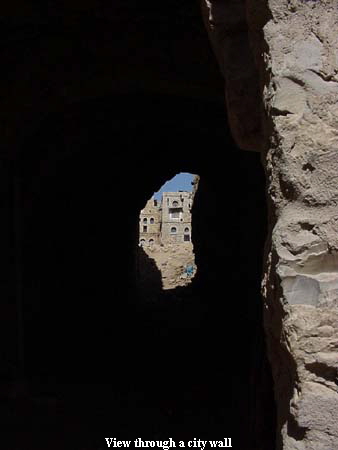 |
Next was Thilla a popular village for the bigger tour groups because of the many stalls with
Yemeni wanna-haves. When we drove through the big doors in the mud brick wall, a small wave of happy faced children flooded the scene. We stepped out in a crowd of children all
asking us to be our guide. We carefully maneuvered silently through the small crowd, trying to get the message across that we liked to walk the city on our own. That helped to some
extends. During our stroll a group of three young girls walked ahead of us speaking perfect English explaining village artifacts we encountered. How they managed to pick up the English
language so well was a riddle to us.
Their lively talking attracted the attention of many young shopkeepers in the street ahead.
Some of them quickly opened their shop and started to brush out their shop to make it look as attractive as possible. Walking past without at least taking a look at their merchandise
was almost impossible. Their happy faces radiated the enthusiasm and commitment at which these kids run their shops.
Further on we encountered a huge water collection basin. It was filled half with all sorts of green stuff (chewed qat?) almost covering the complete surface. Not so long ago people
used these basins for collecting drinking water. Now most villages have diesel engines pumping water from underground reserves to closed water collection basins on the top of a
mountain. In most villages we found pipe networks distributing water to the houses. Pipes simply laid out on the pavement shining brightly from being walked over or being part of kids
play. The open air collection basin we saw was now used for feeding animals or washing clothes.
In another village we saw a similar water basin with Yemeni houses build on the walls of the
basin. A beautiful scenery resembling Venice in the Middle Ages. It looked like this basin was regularly maintained, the water was bright without the green stuff we saw in the other village.
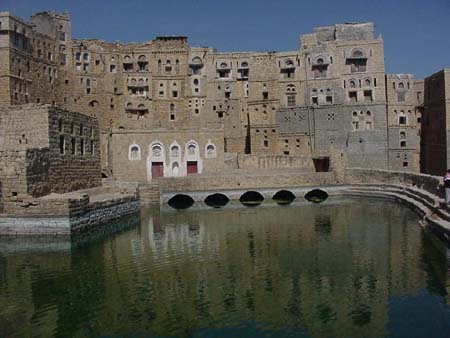 |
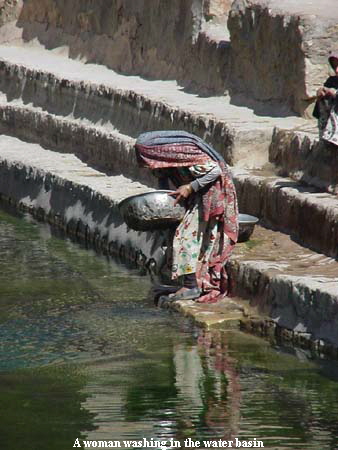 |
The highlight of the day was the view from a plateau at the edge of Kawkaban. We could see
Thilla, Hababa and the curvy road leading to Sana'a. In the village itself we passed a small shop where a man was busy making scissors from bombshells. Really neat stuff, the man
was proud to show us all the other things he made from military waste. We liked his initiative and hoped he would find an elegant solution to get rid of the huge heap of Kalasnikofs too.
From Kawkaban we walked down to yet another Shibam, a downhill walk of 30 minutes on easy gravel trails.
From there Abdul picked us up and drove us back to Sana'a. It was a nice day trip, getting a
glimpse of the life of Yemeni people living in mountain villages.
The next day the wedding took place in the street next to our Hotel. It was the wedding feast for the men.
The women have a separate private party on a different day. Janine was invited to both
events and had the privilege to see the wedding from both sides. In the afternoon we heard a large group of people chanting followed by several Yemeni songs in the streets. This
continued till sunset and brought an atmosphere to the neighborhood very hard to describe. The singing was quite different from what we've heard from the daily prayers. Very melodic and pleasant to listen too.
The actual ceremony started at sunset and we were invited to join. The groom was standing
in the streets some 100 meters from his home. He was dressed in clothes we hadn't seen before in Yemen. The sword he held was lying on his shoulders and was fully decorated with
golden ornaments. A group of men was singing passionately in front of him. When the group stopped singing he made one step towards him house.
Then the singing started again. It was a fascinating experience. The groom looked very calm
and confident, he was standing in the streets very still and looking straightforward.
During the event we suddenly were asked to pose with the groom for pictures. It was very
clear we couldn't refuse and consequently our pictures where taken many times by many locals.
The groom thanked us politely for the occasion. The singing continued and the whole group moved towards the house of the groom.
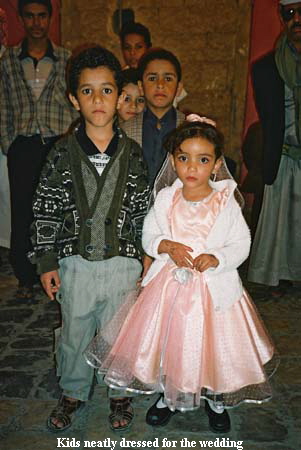 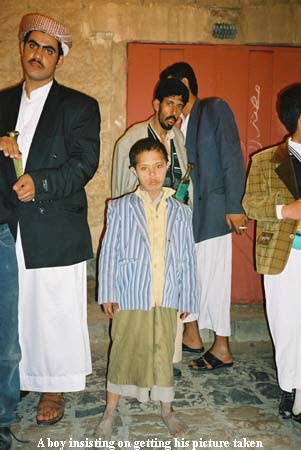
In an open space in front of the house the ceremony changed. A group of men started
dancing in circles showing their happiness to the groom.
Next was a part inside the house of the groom. The best and biggest room at the heighest
floor of the house was prepared for the party. We were asked to take a seat close to the groom at the far end of the room.
Quickly the room flooded with men and the temperature started to rise rapidly. Qat, tea and
water was fully available and everyone around us joined in what was going to be a very long qat chewing session.
We chewed a few leafs too, drinking water while talking with several Yemeni men around us.
We drank water as our lives depended on it, it was incredibly hot. And still this was the coolest period of the year.
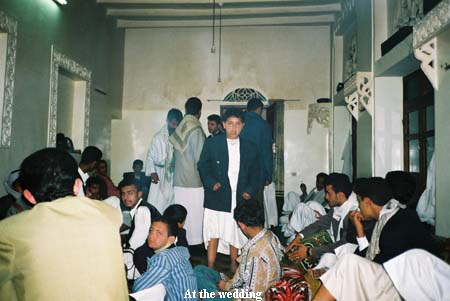 |
After an hour several small groups of men started dancing in circles in the packed room. The
floor of the mud brick building was shaking and we hoped this room was used many times before for these kinds of events. The groom clearly enjoyed himself, this cultural event was all
his. After several hours the first men started to leave wading through a thick and green blanket of qat branches and leaves. The wedding part was a special and memorable event during our stay in Yemen.
We thanked the groom for his hospitality and wished him a happy and eternal marriage. At the doorstep we found an incredible heap of slippers and shoes. Luckily our huge and clumsy
boots sticked out and we could leave the hot room without having to search for them. The 2nd part of the wedding was scheduled the next day and was a women only occasion.
The next afternoon, Christine, a German woman, and I (Janine) were invited to the wedding of the bride. We had bought some chocolates for her, as a little present. We walked to a big
house, first chaperoned by Anwar, the last few meters by a little girl.
A bit nervous, uncertain what to expect, we entered a small room, through a doorstep covered
with a curtain. There, some beautiful young girls were trying to make their looks even more beautiful. Guess that's something women all over the world have in common. Through another
doorstep, again covered with curtains, we entered the weddingroom.
Our mouths simply fell open in complete surprise and amazement. Not able to move our legs,
we stood there in the doorstep, just looking at the scene in front of our eyes. We understood immediately why men were not allowed to attend and why we were not allowed to make
pictures. And the latter is such a pity, because words simply can not express what we were looking at.
The room was completely filled with women, unveiled and dressed in the most beautiful
colored clothes. It seemed that especially the young girls were in a contest of who's the sexiest girl. Most women had beautiful henna tattoos on their hands and feet. The older
women were chewing qat and smoking the nargileh. The young girls were dancing intriguing belly dances on Arabic music played by a one-woman band. We could easily imagine that
this was similar to a scene from a harem of the past. The bride was dressed in a beautiful white wedding dress and was sitting on a platform, looking at her friends and family having fun.
And there Christine and I stood, completely not elegant at all in our outdoor clothing with huge walking shoes, a big contrast to the others. And of course, everybody was looking at us.
Hiding ourselves wasn't an option at all because we were simply much much taller than all the other women were. So we decided to congratulate the bride, and as graceful as possible on
heavy walking shoes, avoiding stepping on toes we walked towards her. Of course, embarrassed as we were already, everybody wanted to make a picture of us with the lovely bride.
After that, we managed to make ourselves somewhat invisible by sitting in the back, trying to fold our knees behind our ears, being as small as possible.
We were offered some tea, and quietly we drank it, amazed by the sight of so much unveiled colorful Yemen women in one room. Normally you just see the women in black clothing, with a
black veil, only their eyes uncovered. The women were radiating such elegance, self-confidence and pride. Christine and I were thrilled to be able to experience this.
After a while, we felt a bit more at ease and were trying to make some conversation with some girlfriends of the bride. They told us that the bride was very honored that we made it to
her wedding. We told them that we felt just the opposite and we were the ones to be honored to be invited. Just at the point we felt completely at ease, the girls invited us to dance. Not just
a dance, but a belly dance! Rejection was simply out of the question, so totally embarrassed we stood up and tried to copy the rhythmical movements the girls made. And today, we can
honestly say that the belly dance is of a totally different magnitude than the birdie dance. The movements of arms and legs, feet and hands, back and belly, we simply couldn't coordinate it
the same way the girls did. It must have looked like some 1200-pound elephants trying to dance a ballet. But the audience was enjoying it, judging by the amount of pictures taken.
After a while the band stopped playing. We assumed that this was the sign that the party had come to an end, because most women took their nargileh and left the room. It was late
already and tired as we were of this trilling experience, we thanked the bride and left too. Arriving in our hotel room, I tried to express the wonderful experience to Arno, so that he could
picture it. But as I said before, words were not enough.
The days after the wedding we organized a two-day trip to the Haraz Mountain again with
Abdul. We prepared ourselves to explore the terrain to be able to come back one day to make a long trek through this remote area. Our schedule was to drive to Manakah and then Al
Hajara, two mountain villages situated very close to eachother. From there we wanted to make a few short walks through the area.
At the day of departure we found a very talkative Abdul at the Sultan Palace Hotel. He was visibly happy with the opportunity to drive us to Manakah and back. We quickly left after
breakfast in an awakening Sana'a. At the outskirts of Sana'a just before the first mountain pass we stopped at the Chinese memorial. This burial place honors the Chinese road
workers who lost their life during the construction of the road leading to the coast. Aid from communist countries was substantial those days helping Yemen with its infrastructure. We
stood there facing many burial stones covered in Chinese writings. We could overlook the valley of Sana'a, a particular nice view especially with the rising morning sun behind us.
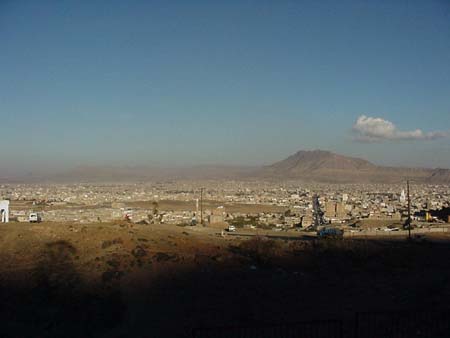 |
The road to Manakah impressed us, making a road in the rough volcanic terrain must be
gruwesome. We stopped at several mountain ridges, amazed with the views ahead of us. Crop fields gave the mountains a layered perspective.
Springtime covers the volcanic rock with green carpets, a result of the hard work of farmers in
the region. Tropical crops were grown in the valleys, coffee and mango trees clearly dominated the area.
After several hours we reached the busy junction just before Manakah. Abdul tried to buy
some qat while we practiced the language skills of the many youngsters cruising the area. Some of them took a ride at the back of our car up the mountain to Manakah. Abdul didn't
seem to matter the crowd of kids hanging at the back of his car. At Manakah we drove through a busy street, sheep, qat, coffee and Kalasnikofs dominated the trade.
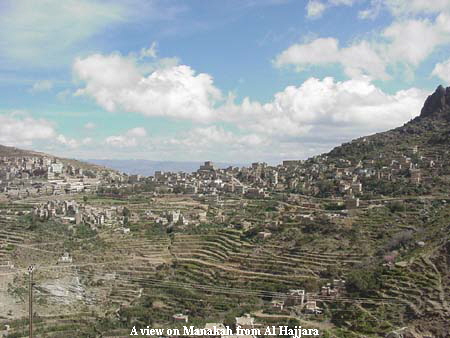 |
At the edge of Manakah the asphalt road stopped, continuing on a bumpy rocky road.
Surprisingly we encountered a police car on this stretch a white & blue Hyundai family car traversing boulders and deep ditches. The road was in its best shape, no mud and landslides
. After several kilometers of being rocked through the car we reached Al Hajarra. At the Al Hajarra Hotel we were greeted with passion. Quickly we were shown our room, a space with
many mattresses on the ground and large windows overlooking the valley below. We accepted without hesitation, the view was simply awesome.
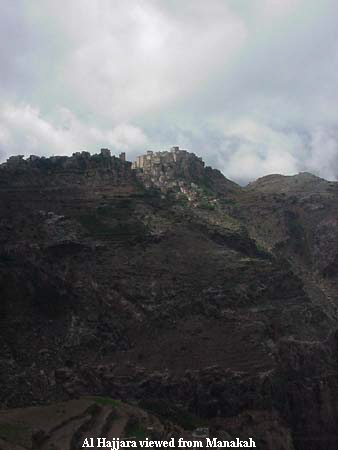 |
After lunch we decided to cruise the area alone. Not a simple task, many youngsters were
eager to guide us through their village. Luckily we found a small trail behind the Hotel without having to pass the main entrance gate of the Hotel. We quickly walked this trail hoping we
would be so lucky to walk the area without guides. After 15 minutes we slowed our pace, confident that we fled the flock of young guides.
The walk was breathtaking, we passed the outskirts of Al Hajjara making a loop around the village located at the edge of a plateau. At the sunny side of the village we stopped in a qat
field and sat there for 2 hours overlooking the valley.
We got several surprised visitors, men making a stroll through the qat fields. Luckily for us the
qat was harvested already, otherwise we would probably be sent away by guards patrolling the precious qat fields. Ofcourse we were treated on qat, offers we simply could not refuse.
Especially not when sitting in the qat fields of others.
Back at the hotel we brushed our green qat teeth again noticing nothing from the effects of
chewing qat. From our room we could watch some of the village life. Many children played in the area and men were sitting on rock plateau's enjoying the last rays of the sun. A life so
incredibly different from ours. A life so close to nature, making ours feel so incredibly artificial. Several moments from the past months flashed through our heads. Turkish, Iranian and
Arabic themes of life, we've seen so much in such a short time. And still we've seen only small parts of it. The sunset lit our room orange and made our faces glow, time flies for sure. The
thought of the end of our journey made us silently watch Al Hajjara disappear in the darkness of the night.
Dinner was huge and delicious. A group of French paragliders and one western women with
her Yemeni guide joined us creating a lively atmosphere. After dinner we were approached by a young man, his name was Noman. He told us he heard about our journey through the
Middle East. After a while we understood that Ahmed, our driver during the trip through the south of Yemen, was his close friend. He offered us to be our guide showing us the Haraz
Mountains. Although we only had one day left here, we agreed trying to make the most out of that day. Noman smiled, he was happy he could show us a few things from his region.
Later that evening, Noman proved to be a gifted dancer. He performed several stylish Yemeni dances while swooping with his Yemeni dagger through the air. After a cup of tea Noman
explained to us that there was a strange event happening that night. "The moon is sick" he wishpered. At first we thought, the dancing might have gotten to his head. He explained that
all the mosques had special night services praying to the health of the moon. Looking outside we could see an almost full moon, but there was something-strange happening. At the side of
the moon there seemed to be some kind of bright cloud. But again it wasn't a cloud, it didn't move at all and radiated brightly. Never having seen this before we couldn't explain what we
were seeing. We agreed with Noman, the moon was sick indeed.
After a restless night we departed early with Noman. He took us to a place of worship called
Al Khutayb. An important place of pilgrimage for members of a sect of whom several life in India. Once a year they visit the site and overwhelm the area with their tents. Some of the
members are quite rich and have donated piles of money making the place look like a real expensive shrine. We walked over neatly paved roads and gazed at the wealth displayed in this remote mountain village.
The full day we spend walking through the mountains visiting small-fortified villages. Noman proved to be a valuable guide, he showed us trails we would have never found on our own. He
could open doors that would have stayed closed for us otherwise.
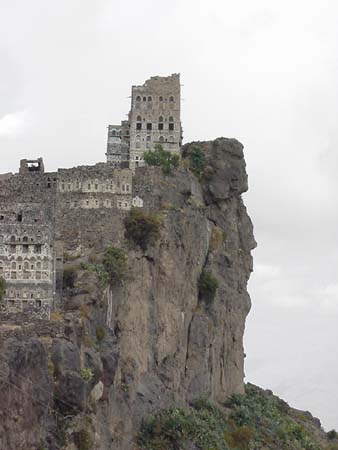 |
During our walk he showed us hand drawn maps he made on reconesaince treks.
Sometimes he spends weeks on his own walking through the mountains trying to find new trails.
We made many mental notes that we must return here in the future.
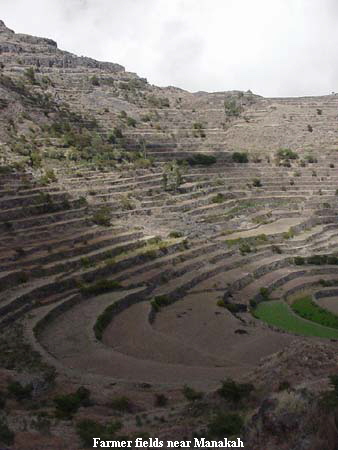 |
The Haraz mountains are literally undiscovered.
Back in Manakah we said good-bye to Noman and drove with Abdul back to Sana'a. Just
before sunset we were back at the Sultan Palace Hotel. Exhausted we crashed in our room and slept long and deep.
The last week in Sana'a we spend with the people of the Sultan Palace Hotel. Anwar the
reception manager helped us several times finding our way through non touristic area's of Sana'a. We visited the university of Sana'a, were Anwar studies law.
Also a friend of Abdulkarim, the owner of Sultan Palace, invited us for lunch. Abdallah is a professional translator who lives in a nice apartment with his wife and son. Their hospitality
was refreshing and we talked about both our lives.
On our last day in Yemen we shopped for a few things in the old city center. We said good
-bye to the people of the Sultan Palace Hotel with whom we've spent many days with.
Our stay in Yemen was simply an awesome experience, and we promised ourselves to return either by car or by plane in the future.
Departure from Sana'a airport was in typical Yemeni style. Chaotic with the many smells Yemen is rich of. A one-night stay in Dubai was simply dull and exhausting, the luxury
displayed at the terminal didn't interest us for a bit. After our return flight to Amsterdam we entered the chilly, rainy western world again. Back home it was only 6 degrees and we
shivered in our beds for a long time, longing for the warmth of the Orient.
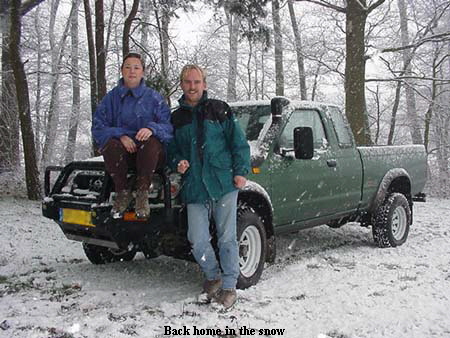 |
|
|
